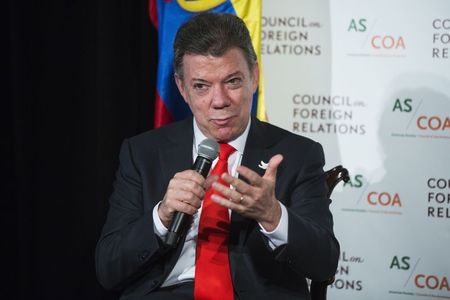By Daniel Bases
NEW YORK (Reuters) - Ending Colombia's 50-year war against Marxist rebels without a ceasefire will require carrots, sticks and social policy incentives, President Juan Manuel Santos said on Tuesday.
In nearly two years of talks between the government and the Revolutionary Armed Forces of Colombia (FARC) in Cuba, three out of five points in the peace process have been agreed. Santos reiterated there would be no ceasefire until the final two points are settled in a comprehensive plan.
"It is less costly because if you have a ceasefire, you will give a perverse incentive for the guerrillas and never reach a peace agreement," Santos said following remarks delivered to the International Economic Alliance in New York.
One of the agreed points is to get rid of the lucrative drug trafficking trade in Colombia, which serves as a major source of FARC funding. However replacing those funds is not so easy, and other activities such as illegal mining have proliferated to fill the cash void.
Asked how he would convince guerrillas to lay down their arms and forgo these lucrative activities, Santos, who was seen as more moderate in his dealings with FARC than his hardline predecessor Alvaro Uribe answered: "There's a well known policy known as the carrot and the stick. That is what we use."
"Today, we have some regions where extortion is going up because we took completely away their capacity to continue trafficking in drugs. The same as in mining activity, they have discovered illegal mining as a new source of revenue. We go after them, but we need to give them opportunities to live," Santos said.
Santos has delivered some of the heaviest blows against the FARC, during both his presidency and his time as defence minister under Uribe. He was responsible for killing key rebel leaders like Raul Reyes, Mono Jojoy and Alfonso Cano.
"We have, probably, the best armed forces in our history. Very effective. We are even exporting their know-how that we have been accumulating at high cost for the last 20-30-40 years," he said.
So far the two sides have agreed, in addition to getting rid of drug trafficking, to creating a process for FARC to participate in public politics and for rural development in order to help incentivise people not to engage in illicit activities.
Points yet to be agreed are how to implement "transitional justice" which is related to reparations for war victims. The last element is how to disarm, demobilize and reintegrate the guerrillas into the economic and social fabric of a nation of 47 million. The war has killed 200,000 people while displacing millions.
Any peace deal must be approved in a national referendum.

Santos told the audience, a mixture of executives, diplomats, and journalists, that a peace plan will boost the fast growing economy's annual gross domestic product by 2 percentage points in perpetuity.
(Additional reporting by Helen Murphy in Bogota; Editing by Cynthia Osterman)
